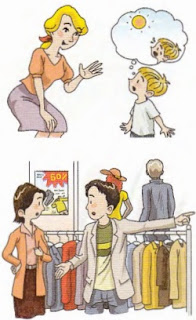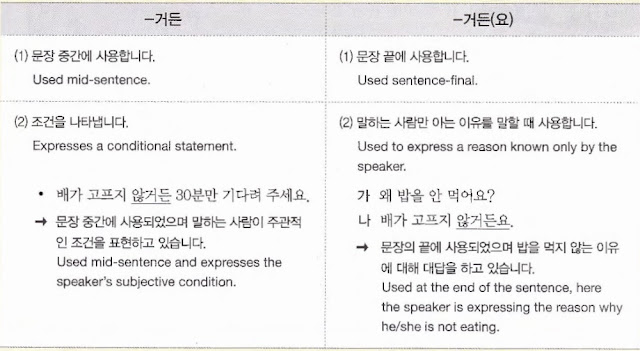 가: 엄마, 이렇게 더운데 꼭 같이 가야 돼요?
가: 엄마, 이렇게 더운데 꼭 같이 가야 돼요?
Mom, do I really have to go with you in this heat?
나: 가기 싫거든 안 가도 돼. 나 혼자 다녀올게.
If you don’t want to go, then you don’t have to. I’ll go by myself.
가: 여보, 이 옷 어때요? 저에게 안 어울리는 것 같지요?
Dear, how are these clothes? Wouldn’t you agree they’re not really my style?
나: 이 옷이 마음에 안 들거든 다른 가게에 가 봅시다.
If you don’t like these, then let’s go to another store.
This expression has the meaning of “if the statement (in the preceding clause) is actually true, then…” It is generally only used in casual conversation.
 • 바쁘지 않거든 잠깐 만납시다.
• 바쁘지 않거든 잠깐 만납시다.
If you’re not busy, then let’s meet for a bit.
• 할 말이 있거든 오늘 일이 끝난 후에 하세요.
If you’ve got something to say, then let me know after work today.
• 벚꽃이 피거든 여의도에 꽃구경을 히-러 가요.
if the cherry blossoms are in bloom, then let’s go flower viewing in Yeoido.
• 그 사람이 친한 친구거든 여행을 같이 가자고 해.
If he/she is a close friend, then ask him/her to come along on the trip.
This expression only sounds natural when the following clause contains an imperative, propositive, or a form that expresses the speaker’s will or conjecture, such as -겠-, -(으)ㄹ 것이다, or -(으)려고 하다.
• 고향에 도착하거든 전화합니다. (X)
->고향에 도착하거든 전화하세요. (〇)
• 방학을 하거든 배낭여행을 가겠어요. (〇)
• 민우 씨에게 어려운 일이 생기거든 언제든지 도와줄게요. (〇)
• 웨이밍 씨가 오거든 출발하려고 합니다. 조금만 기다려 주세호. (〇)
The meaning of the -거든 form which occurs mid-sentence is very different from the -거든 form which occurs in the sentence-final position.

-아/어야
>> Full of Intermediate grammar: Click here
